到达某地的常见英语口语表达
到达某地的常见英语口语表达
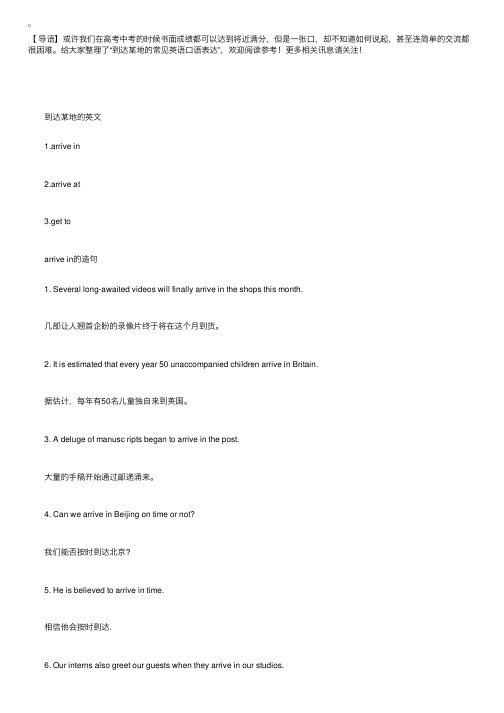
【导语】或许我们在⾼考中考的时候书⾯成绩都可以达到将近满分,但是⼀张⼝,却不知道如何说起,甚⾄连简单的交流都很困难。
给⼤家整理了“到达某地的常见英语⼝语表达”,欢迎阅读参考!更多相关讯息请关注! 到达某地的英⽂ 1.arrive in 2.arrive at 3.get to arrive in的造句 1. Several long-awaited videos will finally arrive in the shops this month. ⼏部让⼈翘⾸企盼的录像⽚终于将在这个⽉到货。
2. It is estimated that every year 50 unaccompanied children arrive in Britain. 据估计,每年有50名⼉童独⾃来到英国。
3. A deluge of manusc ripts began to arrive in the post. ⼤量的⼿稿开始通过邮递涌来。
4. Can we arrive in Beijing on time or not? 我们能否按时到达北京? 5. He is believed to arrive in time. 相信他会按时到达. 6. Our interns also greet our guests when they arrive in our studios. 我们的实习⽣也会在嘉宾抵达演播室的时候向他们致以问候. 7. We should arrive in half an hour, barring hold - ups. 若⽆交通阻塞,我们半⼩时后可到达. 8. The subject of the bibliography was due to arrive in fifteen minutes. 这份⽬录的主⼈再有⼗五分钟就该到了. 9. My father will not arrive in Tianjin until next week. 我的⽗亲下周才到天津. 10. She started early so that she might arrive in time. 她早⾛,为的是她可以及时到达. arrive的常见句型 ⽤作动词 ⽤作不及物动词 S+~(+A) “When did you arrive?”“Late this afternoon.” “你什么时候到的?”“今天下午⽐较晚的时候到的。
初中英语“到某地”常考词汇搭配have +gone tobeen to解析
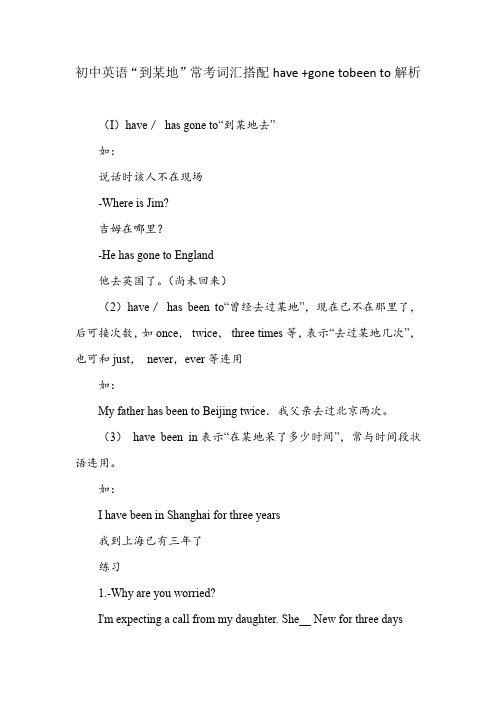
初中英语“到某地”常考词汇搭配have +gone tobeen to解析(I)have/has gone to“到某地去”如:说话时该人不在现场-Where is Jim?吉姆在哪里?-He has gone to England他去英国了。
(尚未回来)(2)have/has been to“曾经去过某地”,现在已不在那里了,后可接次数,如once,twice,three times等,表示“去过某地几次”,也可和just,never,ever等连用如:My father has been to Beijing twice.我父亲去过北京两次。
(3)have been in表示“在某地呆了多少时间”,常与时间段状语连用。
如:I have been in Shanghai for three years我到上海已有三年了练习1.-Why are you worried?I'm expecting a call from my daughter. She__ New for three daysA has gone toB has been toC. has been inD. has come in2.I'd like you to tell me something about She is in Nongjia I'm sorry, but neither Jack nor I__thereA have beenB had beenC have goneD has gone3.-Is Tom at home?No. he __ to townA has beenB has goneC goesD will go答案:A A B初中英语核心词keep考点解析keep a promise 遵守诺言keep a secret 守秘密keep an eye on 留神照看keep watch 注意,警惕,提防keep back 扣下,隐瞒,忍住(眼泪)keep body and soul together 维持生活keep in mind 记住,想着keep off 避开,不踩keep one’s balance 保持平衡keep on doing不停的干某事(强调动作的反复性,可能有停顿)keep doing sth 不停的干某事(调动作的持续性)keep out 遮挡,使不入内keep silence 保持沉默(安静)keep away from 远离,不靠近keep sb from doing sth阻止某人做某事keep sb doing sth 使某人一直做某事keep up 保持,维持,继续(某活动)keep up with 不落在后面,跟上初中常考核心词汇tall,high与highly的区别应用tall,high与highly都与“高”有关,它们的区别在于:一、tall是形容词,表示“本身高”,通常指人、动词,或者其它比较修长的东西如树、旗杆等等。
arrive in, arrive at, reach, get to
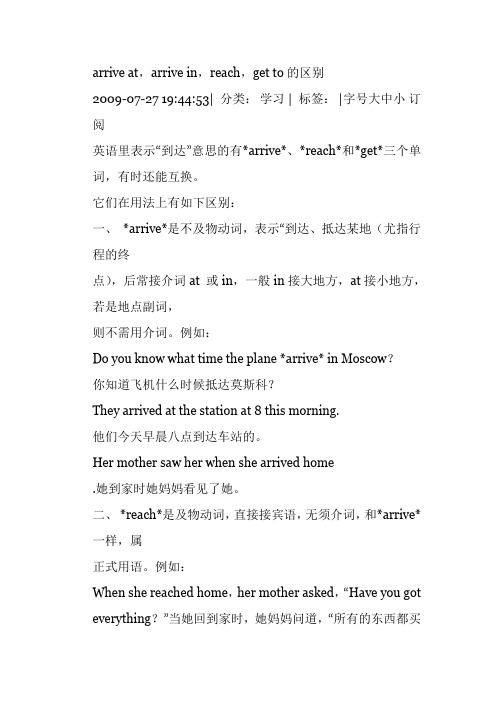
arrive at,arrive in,reach,get to的区别2009-07-27 19:44:53| 分类:学习 | 标签: |字号大中小订阅英语里表示“到达”意思的有*arrive*、*reach*和*get*三个单词,有时还能互换。
它们在用法上有如下区别:一、*arrive*是不及物动词,表示“到达、抵达某地(尤指行程的终点),后常接介词at 或in,一般in接大地方,at接小地方,若是地点副词,则不需用介词。
例如:Do you know what time the plane *arrive* in Moscow?你知道飞机什么时候抵达莫斯科?They arrived at the station at 8 this morning.他们今天早晨八点到达车站的。
Her mother saw her when she arrived home.她到家时她妈妈看见了她。
二、*reach*是及物动词,直接接宾语,无须介词,和*arrive*一样,属正式用语。
例如:When she reached home,her mother asked,“Have you got everything?”当她回到家时,她妈妈问道,“所有的东西都买了吗?”They reached Beijing on February 17.他们于二月十七日到达北京。
三、和*arrive*一样,*get*也是不及物动词,只是它多用于口语,其后接的介词是to,后面如接副词,则不用介词to。
例如:I *get* to school at about 7:30 every day,and I *get* home at 5:00 in the afternoon..我每天7:30到校,下午5:00到家。
Have we got to the zoo yet?我们到动物园了吗?The visitors got there last night.参观的人昨晚到这儿的。
arrivein,arriveat,reach和getto的用法和区别
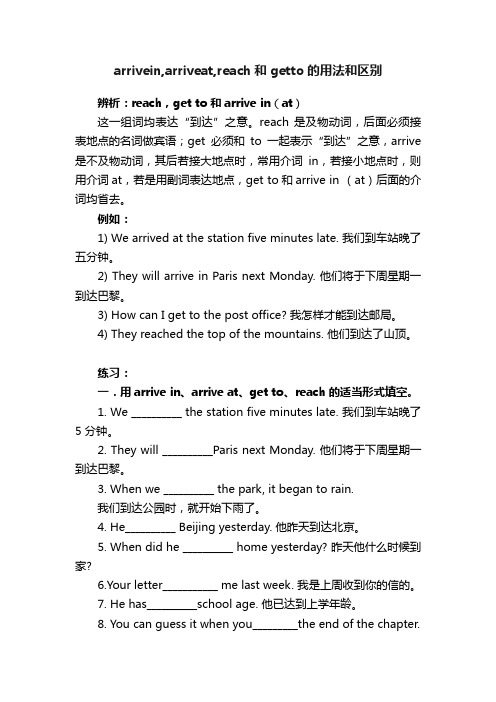
arrivein,arriveat,reach和getto的用法和区别辨析:reach,get to和arrive in(at)这一组词均表达“到达”之意。
reach 是及物动词,后面必须接表地点的名词做宾语;get必须和to一起表示“到达”之意,arrive 是不及物动词,其后若接大地点时,常用介词in,若接小地点时,则用介词at,若是用副词表达地点,get to和arrive in (at)后面的介词均省去。
例如:1) We arrived at the station five minutes late. 我们到车站晚了五分钟。
2) They will arrive in Paris next Monday. 他们将于下周星期一到达巴黎。
3) How can I get to the post office? 我怎样才能到达邮局。
4) They reached the top of the mountains. 他们到达了山顶。
练习:一.用arrive in、arrive at、get to、reach的适当形式填空。
1. We __________ the station five minutes late. 我们到车站晚了5 分钟。
2. They will __________Paris next Monday. 他们将于下周星期一到达巴黎。
3. When we __________ the park, it began to rain.我们到达公园时,就开始下雨了。
4. He__________ Beijing yesterday. 他昨天到达北京。
5. When did he __________ home yesterday? 昨天他什么时候到家?6.Your letter___________ me last week. 我是上周收到你的信的。
7. He has__________school age. 他已达到上学年龄。
到达的英文名词

到达的英文名词
到达的英文名词是指到达某个目的地或地方的行为或状态所对应的名词。
在日常生活中,我们经常会使用到这些名词,例如arrival、arrival time、arrival hall等。
下面将分步骤逐一阐述这些到达的英文名词。
一、Arrival
Arrival是指到达某个地方或目的地的行为或状态。
例如,当我们飞行国际航班时,我们需要关注到达的时间和时间表,以便根据到达时间安排行程。
当我们到达目的地时,我们会听到有关到达和入境的说明和指导。
二、Arrival time
Arrival time是指到达某个目的地或地方的时间。
在旅行或航班预定中,我们需要知道到达时间以便安排出行计划。
在其他场合,例如商务谈判或会议中,我们也需要关注到达时间来确保准时到达。
三、Arrival hall
Arrival hall是指到达机场或火车站等交通枢纽后,通过高速公路、车站大厅等进入终点站的场所。
在到达时,我们需要按照指示牌和标志找到到达大厅,并进行出入境手续。
在这里,还会发现一些便利设施如购物商店和咖啡馆等,以便旅客们可以在等待接人时休息和购物。
四、Arrival gate
Arrival gate是指到达机场或其他交通枢纽时,我们通过大门进入终点站的门。
在许多机场中,到达门和登机门相邻而设,但通常需要进入不同的大厅。
在到达时,我们需要从到达门出来,按指示到达到达大厅或出口处。
总之,到达的英文名词是旅行中必须了解的重要术语。
熟练地掌握这些词汇将会有助于我们更好地规划旅行、维护旅行安全和方便。
人教版英语七年级下册第三单元知识点

be like 与look like
look like 问外貌
be like 问性格 , 范围更大一些,有时候既问性格也问外貌
eg :What's your sister like?
你姐姐怎么样? 你姐姐是怎样一个人?
She is kind.她很善良。
She is a beautiful kind girl with long hair and two big eyes.她是一个长发大眼漂亮又善良的女孩。
交通工具
4.in + the /a+小型封闭交通工具或表示 在....中 (in a car/taxi)in my car=by car 5. 步行去某地 (1)walk to +地点 (2)go to +地点on foot 6. 骑自行车常用on a bike或by bike,而不能用in a bike。 骑马、骑骆驼等用on, 如: on a horse, on the camel等。 在表示交通工具的名词前若有具体的时刻修饰时,则用介词by或on均可。如: by (on) the 7:00 bus.
sb pay for sth. 付……
eg. I have to pay for the book lost. sb pay for sb. 替某人付钱
eg. Don’t worry! I’ll pay for you.
pay 主语是人
pay: paid花费钱
Conclusion
花钱 I pay for, I spend on, sth cost(s) me I spend in buying 花时间 sb. spend(s) some time. (in) doing sth =It takes sb some time to do sth
到达的五种表达方式
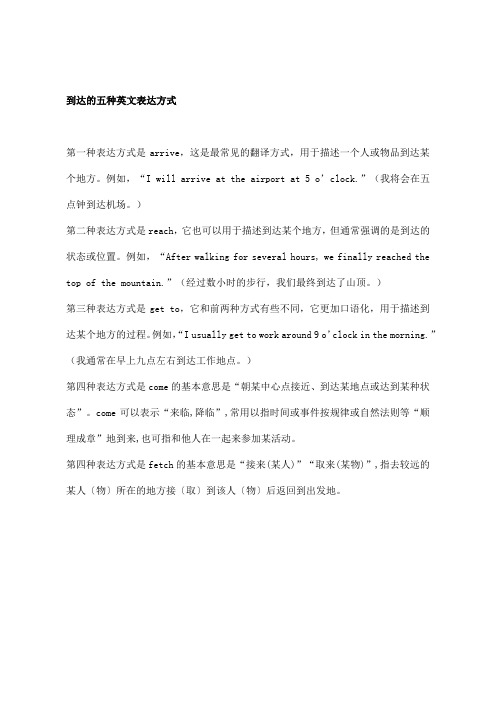
到达的五种英文表达方式
第一种表达方式是arrive,这是最常见的翻译方式,用于描述一个人或物品到达某个地方。
例如,“I will arrive at the airport at 5 o’clock.”(我将会在五点钟到达机场。
)
第二种表达方式是reach,它也可以用于描述到达某个地方,但通常强调的是到达的状态或位置。
例如,“After walking for several hours, we finally reached the top of the mountain.”(经过数小时的步行,我们最终到达了山顶。
)
第三种表达方式是get to,它和前两种方式有些不同,它更加口语化,用于描述到达某个地方的过程。
例如,“I usually get to work around 9 o’clock in the morning.”(我通常在早上九点左右到达工作地点。
)
第四种表达方式是come的基本意思是“朝某中心点接近、到达某地点或达到某种状态”。
come可以表示“来临,降临”,常用以指时间或事件按规律或自然法则等“顺理成章”地到来,也可指和他人在一起来参加某活动。
第四种表达方式是fetch的基本意思是“接来(某人)”“取来(某物)”,指去较远的某人〔物〕所在的地方接〔取〕到该人〔物〕后返回到出发地。
到达reach和arrive和get区别精讲

到达reach和arrive和get区别精讲三个单词都有“到达”的含义:在表示到达某个地方时,arrive和get意思类似,get常用于口语;而reach还有比喻含义。
reach到达(及物动词,可直接后接名词或副词。
)后面直接,接表示地方的名词例如:They reached Beijing at nine.他们9点钟到达北京。
He reached home in the evening.他晚上到的家。
He reached Cambridge shortly before three o'clock.他快到3点的时候抵达了剑桥。
《柯林斯高阶英汉双解学习词典》When the bus reached High Holborn, Tony rang the bell and they jumped offtogether当公交车到达海霍尔本站时,托尼摇响了铃,他们一起跳下了车。
《柯林斯高阶英汉双解注:reach 之后也可接 here, there, home 等词.如:When did he reach home yesterday?昨天他什么时候到家?时候到家?The news reached China apace.消息迅速地传到中国。
They didn't reach the border until after dark.他们天黑以后才到达边境。
I hope this letter reaches you.我希望你能收到这封信。
He did not stop until he reached the door...他走到门边才停下。
If they followed the road, they would be certain to reach a village如果他们沿着这条路走,就一定会到达一个村庄。
《柯林斯高阶英汉双解学习词典》We reached the station just in time. 我们及时赶到了火车站。
arrive和getto有什么区别

arrive和getto有什么区别
展开全文
arrive和get to有什么区别
有奖励写回答共4个回答
会飞的向日葵呀
TA获得超过9339个赞
聊聊
关注
成为第72位粉丝
arrive at/in和get to都表示到达,意思基本相同,注意介词不同.
arrive,不及物动词,arrive的后面要跟in或at.表示到达大城市或国家时要用in,而到达小城市、乡村、车站等小地方则用at.如: We arrived in London last week.我们上周到达伦敦.
The doctor arrived at the village at last.医生终于到达了那个村子.
get,与arrive一样,是不及物动词,所以get常带着to一起出行.不过,当"到达"的地点是副词时,get就不带to了.如:
Ann got to the farm at si x o”clock.安六点钟到达农场.
I got here early in the morning.我一大早就到这儿了.
但稍有区别:
1.如果不指明到达的地点就不能用get了,而要用arrive.如:
When I arrived,they weren”t there.当我到达时,他们不在那儿.
2. get to强调达到的某一个时刻
Please write to me as soon as you get to Pairs.请一到巴黎就给我写信.。
都是“到达”,get、arrive和reach有什么区别丨BBC听英语

都是“到达”,get、arrive和reach有什么区别丨BBC听英语Jiaying大家好,欢迎来到 BBC英语教学的“你问我答”,我是佳莹。
这是一档帮助大家解答在学英语时遇到的难题的节目。
这期节目要回答的问题来自一位网名为“小明星” 的听众,由我来代读他的问题。
Question“Get、arrive” 和“reach” 都有“到达” 的意思,它们有什么区别吗?谢谢。
Jiaying动词“get、arrive” 和“reach” 都可以用来表示“到达某个地方”,这三个词的区别主要在于它们和介词、地点词的搭配和使用。
动词“get” 后加介词“to” ——“get to”,可以表示“到达某地”。
我们来听一个用“get to” 表示“到达” 的例句。
ExampleCould you tell me how to get to the nearest bus stop?你可以告诉我怎么去最近的公共汽车站吗?Jiaying在上面这句话中,搭配“get to” 后面接表示地点的名词性短语“the nearest bus stop(最近的公共汽车站)”,所以“get to the nearest bus stop” 的意思就是“去最近的公共汽车站”。
注意,在用“get” 表示“到达某地” 的时候,有一个例外情况:“get home(到家)” 或者“get here(到这里)、get there(到那里)”,这些搭配不用介词“to”,可以直接加上副词“home、here” 或者“there”,也就是“get home、get here” 或者“get there”。
比如:What time will you get home today?你今天什么时候到家?I’ll call you when I get there.我到了那里就给你打电话。
我们接着来讲“arrive(到达、抵达)”。
关于动词“arrive”,需要注意三个要点。
get arrive reach的用法

get arrive reach的用法
get,arrive和reach都是表示到达的动词,但在使用上有一些不同。
1. Get:一般用于口语中,表示到达某个地方。
例如:I got home late last night.(昨晚我晚回家了。
)
2. Arrive:正式用语,表示到达某个地方。
例如:We arrived at the airport on time.(我们准时到达了机场。
)
3. Reach:强调到达某个目的地,而不仅仅是到达某个地方。
例如:I finally reached my destination after a long journey.(经过漫长的旅程,我终于到达了目的地。
)
需要注意的是,get和arrive通常使用介词at,而reach则常常使用介词to。
例如:I got to school at 8am.(我八点到学校。
)
They arrived at the hotel at midnight.(他们半夜到达了酒店。
)
We finally reached our goal after years of hard work.(经过多年的努力,我们终于达成了目标。
- 1 -。
到达的英语短语三种形式

到达的英语短语三种形式随着当今社会的发展,英语已成为世界上最流行的语言之一。
英语作为一门语言,具有标准化的结构,拥有自己的五大基本要素,其中最为重要的就是短语。
短语有助于更深入地理解和掌握英语,让语言更加地道。
在英语中,到达(arrival)的短语形式可以分为三种形式,它们是arrive at、reach和get to,它们都可以用来表示“到达”的意思。
首先,arrive at一般指的是从远处到达时的感觉,主要用于表示“从远处到达”的概念。
例如:We arrived at the airport at 5 oclock in the morning.(我们在早上五点到达机场)。
其次,reach是一个普通用词,可以用于表达“到达”的情感,它可以指到达任何一个位置,也可以含有某种抵达的态度。
例如:We reached the destination in time.(我们及时到达了目的地)。
最后,get to可以表示最终到达的概念,当所有过程都走完后,可以用get to表示“到达”的情感。
例如:We finally got to the top of the mountain.(我们终于到达了山顶)。
以上就是arrive at、reach和get to这三种形式“到达”的短语,它们都可以表达到达的情感,但也有一定的差别,比如arrive at 指的是从远处到达,而get to可以表示最终到达的概念。
此外,我们也可以通过搭配其他词汇来表达到达的不同情绪,例如come to、enter、land等。
例如:We came to the station in time.(我们已准时到达车站);She entered the office.(她进入了办公室);The plane landed at the airport.(飞机降落在机场)。
通过以上的讨论,我们应当对到达的英语短语有了更深的理解。
从中可以看出,英语中有许多短语可以用来表达到达的意思,我们可以根据实际情况选择适合自己的短语来表达不同的情绪,从而让英语更加地道。
arrive, get与reach的用法区别

arrive, get与reach的用法区别三者均可表示“到达”,区别如下:■arrive 和 get 都是不及物动词,前者较正式,后者则较口语化。
两者之后均不可接宾语,但可接 here, there, home 之类的表地点的副词作状语。
如: What time does the train arrive? 火车什么时候到? We got [arrived] here last night. 我们昨晚到这儿。
要表示“到达某地”,需借助适当介词:1. arrive 之后通常接介词 at (一般用于较小的地方)或 in (一般用于较大的地方)。
如: We arrived at the station five minutes late. 我们到车站晚了 5 分钟。
They will arrive in Paris next Monday. 他们将于下周星期一到达巴黎。
2. get 之后通常接介词 to。
如: When we got to the park, it began to rain. 我们到达公园时,就开始下雨了。
在谈到火车、汽车等或乘客等到站时,通常用 get in。
如: The bus gets in at five thirty. 汽车五点半到站。
■reach 通常是及物动词(较 get 更正式),其后可直接跟地点名词作宾语(不能用介词)。
如: He reached Beijing yesterday. 他昨天到达北京。
注:reach 之后也可接 here, there, home 等词。
如:When did he reach home yesterday? 昨天他什么时候到家? 顺便说一句:reach 除可表示到达某地外,还用于其它意义的到达。
如:Your letter reached me last week. 我是上周收到你的信的。
He has reached school age. 他已达到上学年龄。
到达三种表达方式英语

到达三种表达方式英语英文回答:Arrival in Three Expressions.The concept of "arrival" can be expressed in English through various linguistic nuances that convey distinct shades of meaning. Three common expressions that capturethe idea of reaching a destination or attaining aparticular state include:1. Arrive: Denotes the physical or metaphorical act of reaching a specific location or achieving a desired outcome. It implies a sense of completion and accomplishment, as in "The plane arrived at the airport on time" or "She finally arrived at her goal of becoming a doctor."2. Get to: Emphasizes the notion of reaching a place or fulfilling an objective through effort or intention. It suggests a more active and deliberate process, as in "I gotto the office early this morning" or "He got to the bottom of the mystery."3. Make it to: Conveys a sense of overcoming obstacles or challenges to reach a specific destination or outcome. It underscores the difficulty or significance of the arrival, as in "We made it to the summit of the mountain" or "They made it to the end of the marathon."中文回答:到达的三种表达方式。
“到达”有别

“到达”有别1. arrive之后不能直接接表示地点的名词,需要在这些名词前加介词,介词需按所到达地点的大小来确定。
到达较小的地点(如:机场、车站或商店等)时,用at;到达较大的地点(如:城市、国家等)时,用in;到达岛屿或某事件现场时,常用on。
如:Jim will arrive at london airport at 9:00 am. 吉姆将在上午九点钟到达伦敦机场。
When will we arrive in Shanghai, Mum? 妈妈,我们什么时候才能到上海?At last, they arrived on that island at midnight. 最后,他们终于在午夜到达了那座岛。
“arrive at+名词”还可以表示“达到;达成(目标、结论或阶段等)”。
如:It is hard to arrive at a conclusion. 很难得出结论。
单纯表示“抵达;到达”,而又不出现具体地点时,arrive之后不需要介词。
如:Hurry up, please. The customers have arrived. 请快点儿。
客人们已经到了。
2. reach后面可直接接名词或代词表示“到达;达到;伸手可取”的意思,它比arrive更为正式。
如:They will reach the destination soon. 他们很快就要到达目的地了。
I can’t reach the picture on the wall. 我够不到墙上的那幅画。
The big noise reached her ears. 她听到了巨大的噪音。
3. “get to+地点名词”表示“到达某地”。
如:When did they get to the station? 他们什么时候到的火车站?注意:当arrive和get之后接表示地点的副词(如:home, here, there)时,arrive和get后面的介词要省略。
到达英文短语

到达英文短语
以“到达”英文短语为话题,“到达”几乎可以应用到世界上每一个角落,可以描述运动、旅行、工作、学习等多种活动。
因此,把它们集中起来,有助于更好的运用它们,达到更大的目的。
一般来说,“到达”英文短语有几个主要的类别。
第一类是描述运动的“到达”词汇,例如Arrive、Reach、Come to,其含义为“到达”目的地。
第二类是描述旅行的“到达”词汇,例如Get to、Go to、Land,表示“旅行”到目的地。
第三类是描述工作的“到达”词汇,例如Enter、Entering、Enter into,表示“进入”工作状态。
第四类是描述学习的“到达”词汇,例如Attain、Achieve等,表示达到学习目标。
“到达”英文短语既能把普通的语言表达变得生动有趣,又能帮助说话者更有效地表达自己的想法。
以描述运动为例,用Arrive表达比用到达更有力,尤其是在描述一个特殊场景时更能把情景表达得淋漓尽致。
同样,在描述旅行、工作和学习时,使用恰当的“到达”词汇也能吸引听众的注意力,让整个叙述过程更加生动有趣。
另一方面,“到达”英文短语也能帮助说话者更有效地传达自己的思想。
使用恰当的“到达”词汇,可以帮助说话者把复杂的思想表达的清楚明了。
在描述运动时,用Reach代替到达,可以更清晰地表达出“到达”的意思;在描述旅行时,用Go to而不是到达,可以表达出“到达”的动向;在描述工作与学习时,用Enter而不是到达,更能表达出“到达”的目的。
总之,“到达”英文短语可以很好地把语言表达变得生动有趣,也能帮助说话者更有效地传达思想。
尽管它们按不同的活动分类,但集中起来可以使用它们以达到最大的有效果。
(完整版)arrivein,arriveat,reach和getto的用法和区别练习
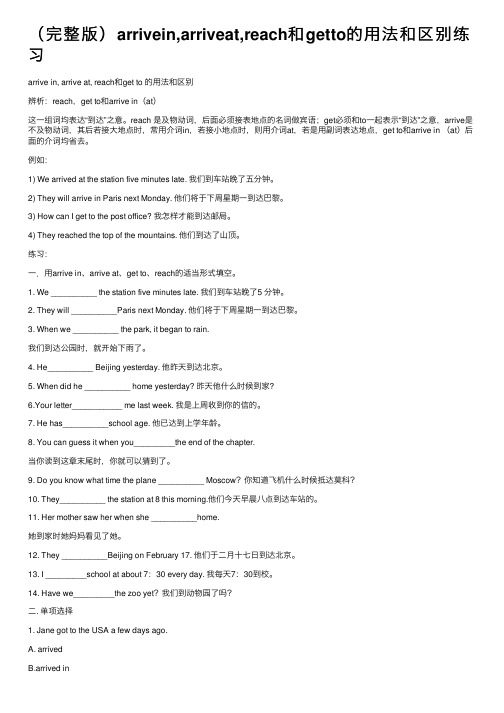
(完整版)arrivein,arriveat,reach和getto的⽤法和区别练习arrive in, arrive at, reach和get to 的⽤法和区别辨析:reach,get to和arrive in(at)这⼀组词均表达“到达”之意。
reach 是及物动词,后⾯必须接表地点的名词做宾语;get必须和to⼀起表⽰“到达”之意,arrive是不及物动词,其后若接⼤地点时,常⽤介词in,若接⼩地点时,则⽤介词at,若是⽤副词表达地点,get to和arrive in (at)后⾯的介词均省去。
例如:1) We arrived at the station five minutes late. 我们到车站晚了五分钟。
2) They will arrive in Paris next Monday. 他们将于下周星期⼀到达巴黎。
3) How can I get to the post office? 我怎样才能到达邮局。
4) They reached the top of the mountains. 他们到达了⼭顶。
练习:⼀.⽤arrive in、arrive at、get to、reach的适当形式填空。
1. We __________ the station five minutes late. 我们到车站晚了5 分钟。
2. They will __________Paris next Monday. 他们将于下周星期⼀到达巴黎。
3. When we __________ the park, it began to rain.我们到达公园时,就开始下⾬了。
4. He__________ Beijing yesterday. 他昨天到达北京。
5. When did he __________ home yesterday? 昨天他什么时候到家?6.Your letter___________ me last week. 我是上周收到你的信的。
- 1、下载文档前请自行甄别文档内容的完整性,平台不提供额外的编辑、内容补充、找答案等附加服务。
- 2、"仅部分预览"的文档,不可在线预览部分如存在完整性等问题,可反馈申请退款(可完整预览的文档不适用该条件!)。
- 3、如文档侵犯您的权益,请联系客服反馈,我们会尽快为您处理(人工客服工作时间:9:00-18:30)。
他们一直盼望的日子终于来到了。
Jenny is a young writer who has not yet arrived.
珍妮是个尚未成名的年轻作家。
The flood of fan mail proved he'd arrived.
崇拜者的信件潮水般地涌来,证明他成功了。
大量的手稿开始通过邮递涌来。
4. Can we arrive in Beijing on time or not?
我们能否按时到达北京?
5. He is believed to arrive in time.
相信他会按时到达.
6. Our interns also greet our guests when they arrive in our studios.
随着这部影片的巨大成功,那位主要演员实际上已经成名了。
I believe that a man who has not arrived by forty will never arrive.
我认为一个人在40岁前没有成就就永远不会有什么成就了。
We shall arrive soon af Nhomakorabeaer.
他在四点钟准时到达。
He arrived after dark.
他是天黑以后到达的。
They arrived on the S.S.Dong Feng.
他们是坐东风号轮船来的。
I suppose he will arrive home in the evening.
我们将很快就到达。
You must arrive at the airport two hours early.
你必须提前两小时到达机场。
The great day has arrived.
伟大的日子已经到来。
The baby finally arrived just after midnight.
她说今天早上没有信来。
The ship has just arrived from Tanzania.
这艘轮船刚从坦桑尼亚到达这里。
At last our holidays arrived.
我们的假日终于来临了。
The day they had been looking forward to had at last arrived.
到达某地的英文
1.arrive in
2.arrive at
3.get to
arrive in的造句
1. Several long-awaited videos will finally arrive in the shops this month.
我想他晚上会到家的。
We were tired when we arrive home.
我们到家时很累了。
He felt in excellent spirits when he arrived home.
他回到家里时情绪非常好。
She says no letters arrived this morning.
这份目录的主人再有十五分钟就该到了.
9. My father will not arrive in Tianjin until next week.
我的父亲下周才到天津.
10. She started early so that she might arrive in time.
婴儿终於在刚过午夜时候降生了.
You know you've arrived when you're asked to appear on TV.
邀请你在电视上亮相的时候,你就知道你已经名声在外了。
她早走,为的是她可以及时到达.
arrive的常见句型
用作动词
用作不及物动词
S+~(+A)
“When did you arrive?”“Late this afternoon.”
“你什么时候到的?”“今天下午比较晚的时候到的。”
He arrived punctually at four o'clock.
几部让人翘首企盼的录像片终于将在这个月到货。
2. It is estimated that every year 50 unaccompanied children arrive in Britain.
据估计,每年有50名儿童独自来到英国。
3. A deluge of manusc ripts began to arrive in the post.
我们的实习生也会在嘉宾抵达演播室的时候向他们致以问候.
7. We should arrive in half an hour, barring hold - ups.
若无交通阻塞,我们半小时后可到达.
8. The subject of the bibliography was due to arrive in fifteen minutes.
Now that his books were sold in every shop, he felt that he had arrived.
既然各家书店都在出售他的书,他就感到自己已经成名了。
With the movie's huge success, the leading actor has really arrived.
